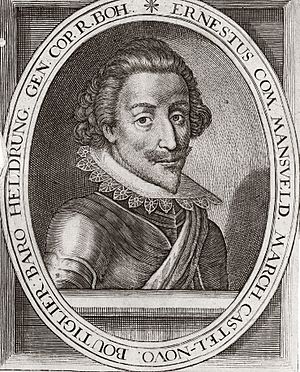Ernst von Mansfeld facts for kids
Quick facts for kids
Graf von Mansfeld
|
|
|---|---|
 |
|
| Born | c. 1580 |
| Died | 29 November 1626 (aged c. 46) Rakovica, Bosnia, Ottoman Empire
|
| Years active | 1595–1626 |
| Parent(s) |
|
Peter Ernst, Graf von Mansfeld (born around 1580, died November 29, 1626), also known as Ernst von Mansfeld, was a famous German military leader. Even though he was Catholic, he fought for the Protestant side during the early years of the Thirty Years' War. He was one of the most important mercenary generals of that time. A mercenary is a soldier who fights for money, not for a specific country or cause.
Contents
Who Was Ernst von Mansfeld?
Ernst von Mansfeld was the son of Count Peter Ernst von Mansfeld. His father was a member of the noble House of Mansfeld and a governor for Spain in the Spanish Netherlands. Ernst grew up in the Catholic faith at his father's palace in Luxembourg.
Early Military Career
Mansfeld started his military career during the Long Turkish War in Hungary. His older half-brother, Charles, was also a well-known soldier and held a high position in the imperial army. While his brother died from an illness, young Ernst stayed and fought in the war for several years.
Later, in the War of the Jülich Succession, he served under Archduke Leopold V of Austria. However, he felt the archduke was ungrateful, so he decided to join the enemies of the House of Habsburg. Even though he remained Catholic, he openly sided with the Protestant princes from about 1610. He became one of their main champions during the first part of the Thirty Years' War.
Mansfeld's Role in the Thirty Years' War
When the Thirty Years' War began in 1618, Mansfeld was sent by Charles Emmanuel, Duke of Savoy. He led about 2,000 men to help the rebelling Bohemians. He successfully captured Pilsen.
However, in the summer of 1619, his army was defeated at the Battle of Sablat. After this, he offered his services to Emperor Ferdinand II. He remained inactive while the king of Bohemia, Frederick V, was forced to flee from Prague.
Soon after, Frederick appointed Mansfeld to lead his army in Bohemia. In 1621, Mansfeld took up a position in the Upper Palatinate. He successfully defended it against attacks from Tilly.
Campaigns in the Palatinate
From the Upper Palatinate, Mansfeld moved into the Rhenish Palatinate. Here, he helped the city of Frankenthal and captured Hagenau. Then, with his commander Frederick, he defeated Tilly at Wiesloch on April 25, 1622. After this victory, his troops plundered areas in Alsace and Hesse.
However, Mansfeld's army was known for causing a lot of damage, even in the areas they were supposed to protect. Because of this, Frederick eventually dismissed Mansfeld's troops from his service.
Joining the Dutch and Later Campaigns
With Christian of Brunswick, Mansfeld then joined the army of the United Provinces. They marched through the Spanish Netherlands to reach the Republic. In August 1622, his army had to fight its way past a Spanish blockade at Fleurus.
His army rested and got new supplies in September. Then, they marched with the Dutch army to help the city of Bergen op Zoom, which was under siege by Spain. After that, Mansfeld's army settled in East Frisia. They captured fortresses and caused great hardship for the people living there.
As a mercenary leader, Mansfeld often paused his campaigns to travel and raise money. This meant selling his army's services to whoever offered the most. He was quite skilled at these diplomatic tasks.
Final Years and Death
Around 1624, Mansfeld visited London three times, where people cheered him as a hero. He also visited Paris at least once. James I, who was Frederick V's father-in-law, wanted to give Mansfeld men and money to help get the Palatinate back.
In January 1625, Mansfeld and his army sailed from Dover to the Netherlands. They tried to help during the siege of Breda but were unsuccessful. Later that year, the Thirty Years' War started again, led by Christian IV of Denmark. Mansfeld returned to Germany to join the fight.
However, on April 25, 1626, Wallenstein heavily defeated him at the bridge of Dessau. Mansfeld quickly gathered another army. He planned to attack the lands belonging to the House of Austria. Wallenstein pursued him as he moved towards Hungary. Mansfeld hoped to get help from Bethlen Gábor, the prince of Transylvania.
But when Bethlen made peace with the emperor, Mansfeld had to break up his army. He started a journey to Venice. However, when he reached Rakovica, near Sarajevo, in Bosnia, he became ill and died on November 29, 1626, from natural causes. He was buried in Split.
See also
 In Spanish: Ernesto de Mansfeld para niños
In Spanish: Ernesto de Mansfeld para niños
 | William M. Jackson |
 | Juan E. Gilbert |
 | Neil deGrasse Tyson |

